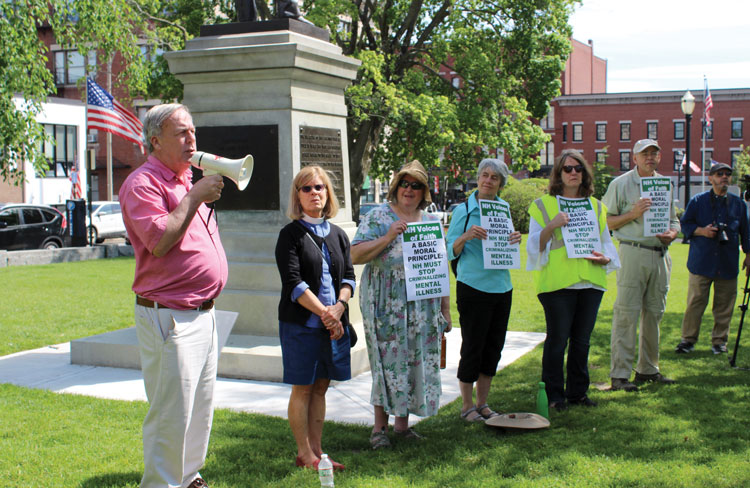Prisons are housing mental health patients who've committed no crimes

New Hampshire state Rep. Renny Cushing speaks into the bullhorn with marchers demanding Andrew Butler be transferred to a psychiatric hospital. Photo by Nancy West, InDepthNH.org
Lack of resources
“It’s something we’re seeing in state after state,” says John Snook, executive director of the Treatment Advocacy Center. “People are grasping for a solution, trying to figure out how to make the best of a terrible situation. It’s discrimination.”
New Mexico, North Dakota, South Dakota, Texas and Wyoming legally use county jail beds temporarily for mental health holds. Sometimes, those in a mental health crisis—typically those who have suicidal ideation—are handcuffed and transported in the back of a squad car and receive no medical attention while held in a cell.
In rural states, stretched county law enforcement resources, coupled with the lack of psychiatric hospital beds and community-based mental health services, leave few options for those needing immediate care. Small towns are often located hundreds of miles away from mental health hospitals, and transporting people in mental health crisis becomes the biggest issue.
“On the outlying jurisdiction eastern plains of Colorado, psychiatric resources are nonexistent,” says Gina Shimeall, a criminal defense lawyer who also volunteers with the National Alliance on Mental Illness in Castle Rock, Colorado.
Law enforcement officers sometimes must drive two or three hours each way to the nearest hospital with mental health units, tying up those officers for an entire day. “Communities didn’t put these transportation times and costs in the budget,” the TAC’s Snook says. “We found Oklahoma law enforcement officers drove 1 million miles in one year just to transport people to mental health facilities. And sometimes, the hospital can’t even take them in once they arrive.”
Jenny Hill, program coordinator for the city and county of Denver’s Office of Behavioral Health Strategies, says if she lived in a rural area and had a stroke, she’d immediately get emergency medical care. “But if I’m experiencing psychosis, you can put me in a jail and hold me there,” she says.
Live Free, or Die?

Photo of Gina Shimeall courtesy of Gina Shimeall.
New Hampshire, where Andrew Butler was held in the state prison’s secure psychiatric unit, also faces a shortage of beds. An estimated 36,000 people in the state live with serious mental illnesses, according to the Treatment Advocacy Center. But in 2016, there were only 158 state hospital beds for psychiatric treatment. That means inpatient treatment during a psychiatric crisis has become nearly impossible. As a result, at any given time, 10 to 12 civilly committed people with mental illness are held in the SPU, according to testimony given in 2010 to a New Hampshire House of Representatives committee studying the issue. Some stay a few months; others stay years.
Advocates point to the cost savings of holding a patient in the prison. In New Hampshire, keeping a mental health patient in the SPU costs $307.21 per day, according to the Department of Corrections, while a stay in the state hospital psychiatric unit costs $1,413 per day, according to the state Department of Health and Human Services.
“This includes locking mentally ill women in the men’s prison. Also, patients with developmental disabilities are locked away in the prison as well. The civilly committed are exposed to criminally convicted inmates,” Butler’s attorney Bloomenthal wrote in response to the state’s argument that the court should dismiss the petition.
The SPU does have clinical staff, says Paula Mattis, director of medical and forensic services at the Department of Corrections, which oversees the prison’s SPU. Staff includes one full-time psychiatrist, two psychiatric nurse practitioners, eight nurses, three social workers, one mental health counselor and one recreational therapist.
Historical justification

Photo of Paula Mattis by Heidi Guinen
Before deinstitutionalization, New Hampshire ran a sprawling mental institution.
“There, those involved with the criminal justice system were held along with mental health patients,” Cushing says. “So, in a sense, it was exactly like what is happening in the prison now, with both populations in one place. But the big difference is they were in a hospital, a huge institution, and everyone’s mental health care was under direction of Health and Human Services. Everyone was clear that this place was all about treating health issues.”
As the federal government pulled support for larger mental institutions, the facility closed, and those mental health patients moved to the state hospital. Those who had been involved in the criminal justice system were moved to the SPU.
Soon afterward, as promises of building a secure psychiatric wing for the New Hampshire hospital were made, the most severely ill patients—who had not committed crimes—were “temporarily” moved to the prison as well, an arrangement that continues today.
The state has several statutes that allow this practice. “The state law is not in alignment with the U.S. Constitution, yet that’s what they’re operating under,” the Treatment Advocacy Center’s Berger says. “The state will have to have a fire lit under them—like get sued—to make these tough budget decisions.”
“There is a culture of complacency that has been created here in New Hampshire,” says advocate Coulter. “After 30 years, it has been given legitimacy.”
New pushes
For years, attempts to fund a new high-security psychiatric facility at the New Hampshire Hospital grounds—estimated in 2010 to cost about $13 million—have failed. Many of those attempts were launched by Cushing. However, in recent years, Cushing has pushed in new directions. In 2016, he joined the TAC and the American Friends Service Committee to file a complaint with the Department of Justice. “The state of New Hampshire is systematically and intentionally violating the Constitution, as well as the civil rights and civil liberties of a very vulnerable population of its citizenry,” the letter states.

Jenny Hill: “In my mind, I was protecting myself from further harm.” Photo courtesy of Jenny Hill.
After receiving no response, in May of 2018, he filed a Freedom of Information Act request for information about the 2016 complaint. In November, he received a notice from the DOJ denying the request, stating that “The records you have requested pertain to an ongoing law enforcement proceeding. After consideration of the responsive records, I have determined that access to the documents should be denied … since disclosure thereof could reasonably be expected to interfere with law enforcement proceedings.”
Cushing responded to the denial in an email to constituents. “Given the totality of what has happened, I don’t believe any reasonable person could possibly conclude anything I do could in any way be construed as interfering with enforcing the laws concerning the rights of people being held in the Secure Psychiatric Unit.”
In addition, this year, Cushing sponsored House Bill 1565, requiring the Department of Corrections to apply to the Joint Commission on Accreditation of Hospitals to accredit the SPU as a psychiatric hospital. Though it passed New Hampshire’s House, the Senate amended the bill, downgrading the accreditation to a behavioral health facility. The DOC was required to file an interim report on the feasibility of accreditation by Jan. 1.
The first step will be reaching out to the National Commission on Correctional Health Care, which can determine what is necessary for accreditation, the DOC’s Mattis says. If the costs of updating the facility to meet standards exceeds its budget, the DOC can request that amount in its budget to be in compliance, she adds. Mattis is confident that they already meet the standards for medical care. Colorado jail hold
In my mind, I was protecting myself from further harm.
—Jenny Hill
Jenny Hill, from Denver’s Office of Behavioral Health Strategies, recalls a night in 2010 when she had a breakdown. A survivor of childhood physical and sexual abuse, the then-46-year-old, who lives in recovery from post-traumatic stress disorder with dissociation and trauma-induced psychosis, went to her ex-husband’s home in Colorado to discuss the financial settlement of their divorce. When he closed the door on her, Hill says, her anxiety heightened. She remembers hearing voices in her head, causing suicidal ideation.
Her ex-husband called the police. When officers arrived at the home in Aurora, Colorado, they handcuffed Hill, put her into the back of a cruiser and brought her to the municipal jail, says Hill, who testified before the Colorado Senate Judiciary Committee in 2017 about this experience.
Being handcuffed terrified Hill. The arrest amplified her anxiety, exacerbating her condition and preventing her from focusing on what officers were saying. She wanted to lie down, but that wasn’t possible in a patrol car. In the cold jail cell, she begged for a blanket for comfort. She was told she would be charged with a felony and could face prison time.
The jail offered no psychiatric treatments and no protection from others. During her 36 hours in the jail, Hill says she was injured by correctional officers after she panicked and became defensive when they approached her. “In my mind, I was protecting myself from further harm,” she says.
One officer understood her condition. “I believe a supervisor who wore a Crisis Intervention Team pin [indicating he had training in handling a mental health crisis] brought me a blanket and took time to talk with me,” she adds. “He helped me understand what was going on, and he helped me calm down.” No charges were filed against Hill.
This article was published in the January/February 2019 issue of the ABA Journal under the headline: "Breakdown: Prisons, jails house mental health patients who've committed no crimes"



